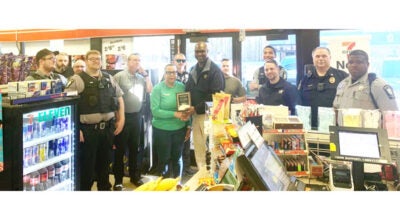Happiness Just Before Sorrow
Published 6:02 pm Tuesday, March 30, 2021
|
Getting your Trinity Audio player ready...
|
By Charles Qualls
Palm Sunday was this past week as I write. The day of Jesus’ Triumphal Entry in Mark 11:1-11 is the backdrop. Jesus is about 2 miles out of Jerusalem. He is at Bethpage and Bethany. We know about Bethany, home of Lazarus, Mary, Martha. If you walked it today, I’m told it would take you about 45 minutes from Jerusalem, mostly because there are no sidewalks to use. Jesus quite literally could have made the trip faster because there was no traffic to dodge in his day.
The instructions he gives are striking in a way. “Go find a colt that has never been ridden. Tell anyone who asks that the Lord needs it, and we’ll return it immediately.” Coats are draped on the colt, in this case a donkey, and also laid on the ground. This is the recognition that Jesus is a king.
Normally, when we’re not having a pandemic, this is a celebratory time in most churches. I love Palm Sunday. Our churches are always filled with the excitement of the children waving palm branches on this day. Maybe yours did, maybe it didn’t this year. If there isn’t a concert, we get up to preach. It’s what we do. But in the midst of all the celebration, the waving of palm branches and an atmosphere festooned with excitement, we should notice that Jesus is the one person who does not speak today.
The sound of silence is palpable from Jesus in our story, all through the parade and all through the entry into Jerusalem. If we listen to the scripture text, and to our inner selves, we have some pieces here that don’t add up. If you are going to have a parade, ride a stallion not a donkey. If you are going to have a parade, have it downtown, not start it 2 miles away. If you are going to have a parade, wave to the crowd, encourage the crowd. Make a speech at some point as the Grand Marshall.
Jesus did none of these things we’d so expect. He wasn’t the only one not getting in on the festivities. The Holy City, a rigid place, guarding so tightly the laws of the covenant, so the religious leaders don’t attend the party. The other Gospels have a moment in this same story when Jesus speaks to the City. “If only you had heard and listened!” we will hear him say over in John’s gospel, for instance. And he weeps. For Jerusalem, but really for all of humanity. So even there, when he does speak, he’s not happy. It doesn’t match the parade, the Triumphal Entry.
There is sadness in this picture of Jesus. He never reacts to anything in this passage. He says nothing. We can only imagine what was going on inside Him. But He knew. The world as He knew it was throwing a party and he was preparing for confrontations. He was readying for some goodbyes, last words of instruction and perspective, even for a showdown and a funeral.
We don’t always value the quiet, and we don’t always listen to the silence that we offer up or the clues that others around us may be giving off. I wonder what Jesus’ face actually looked like as the donkey took him through all the clamor of Palm Sunday? What was his breathing like? How did the tone of his skin compare with what it usually was? What would his posture and his non-verbals have communicated to us if we had been there in the crowd and if we had been paying attention? I wonder if I would have picked up on the notion that his mind just might have been elsewhere as he rode toward and into Jerusalem?
There is a lot of noise on Palm Sunday in Mark’s gospel, there is empty praise and there is a lot of meaningless pomp and circumstance. Jesus says nothing verbally, but He will not be fooled. Meanwhile, he communicated by way of a donkey more than anything. It spoke for him by its contrast to what people would have expected. Jesus was no peacock. He was coming to turn himself over to the authorities in peace. His triumphal entry outlined how his week would go, and I’m not sure very many people who were there picked up on it at all. I’m betting I wouldn’t have either. Because this was a moment of happiness just before great sorrow.





